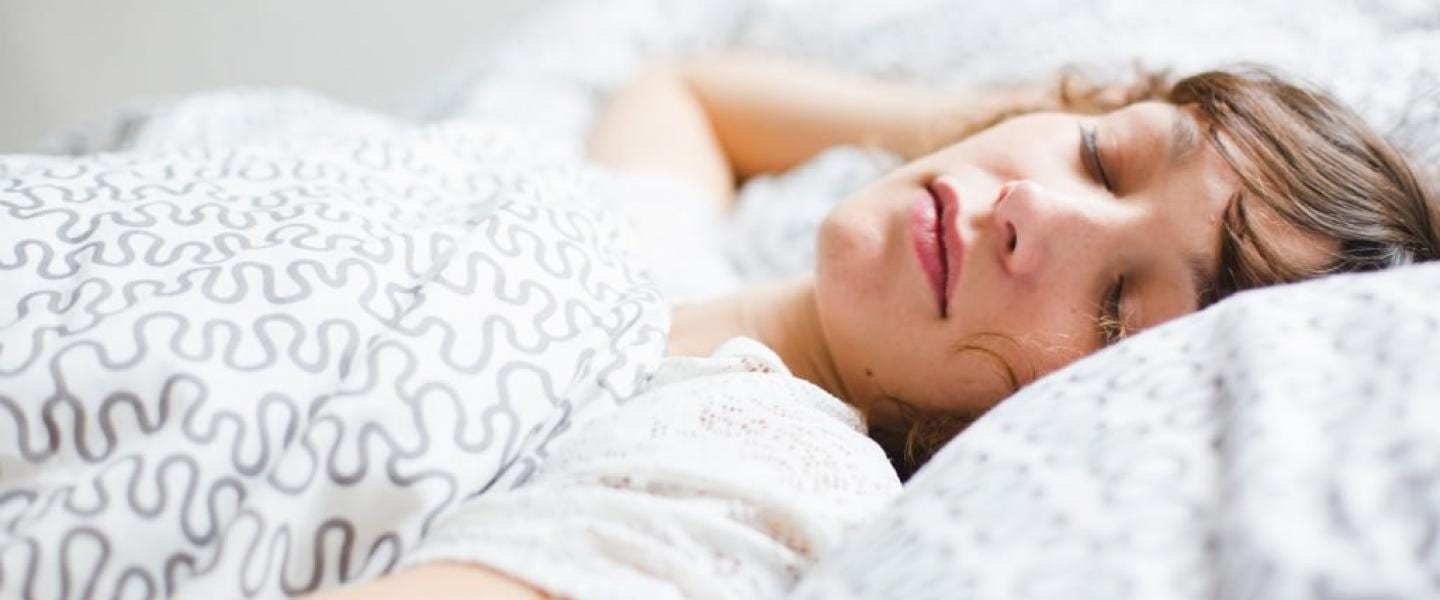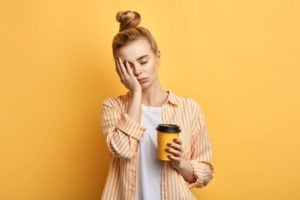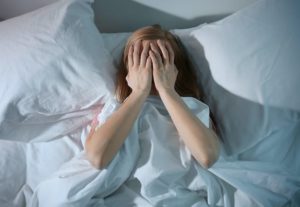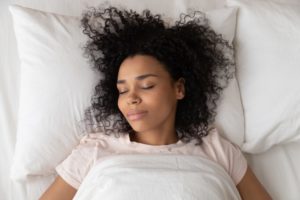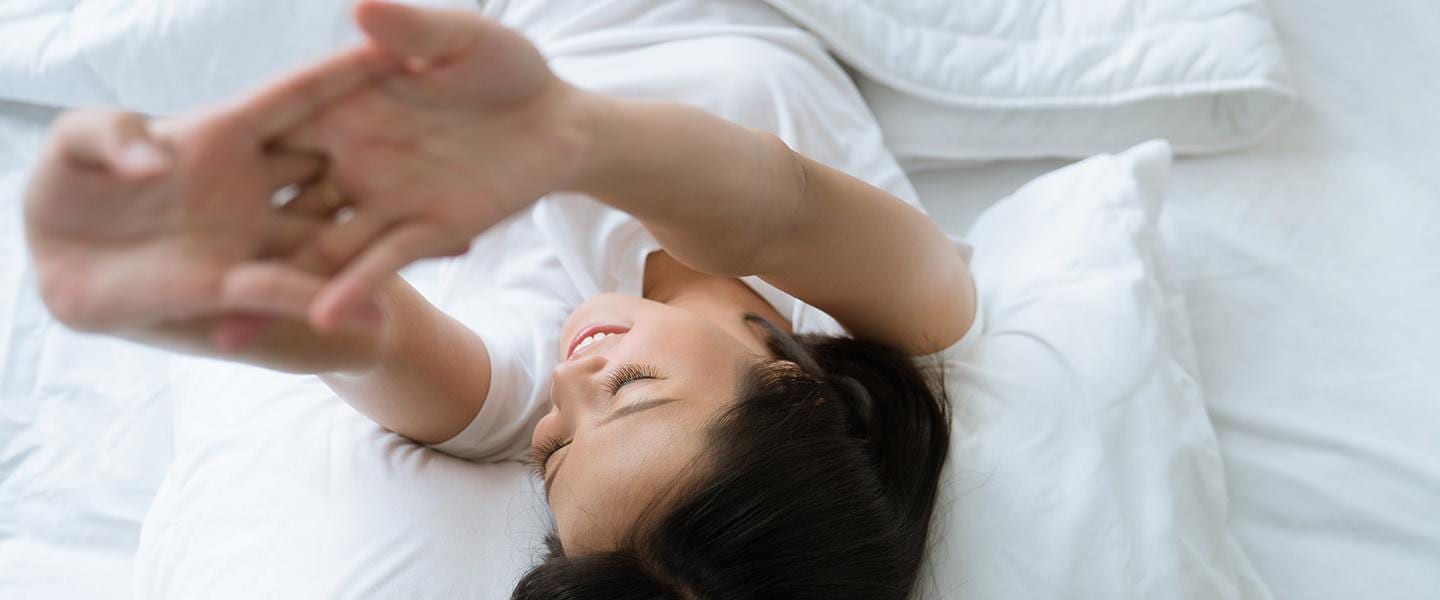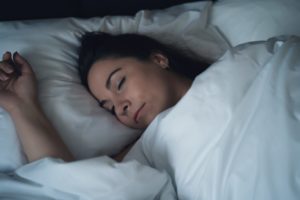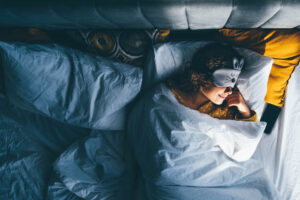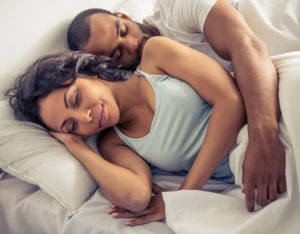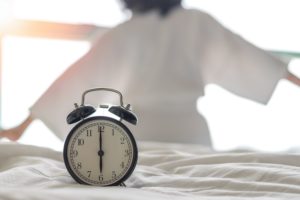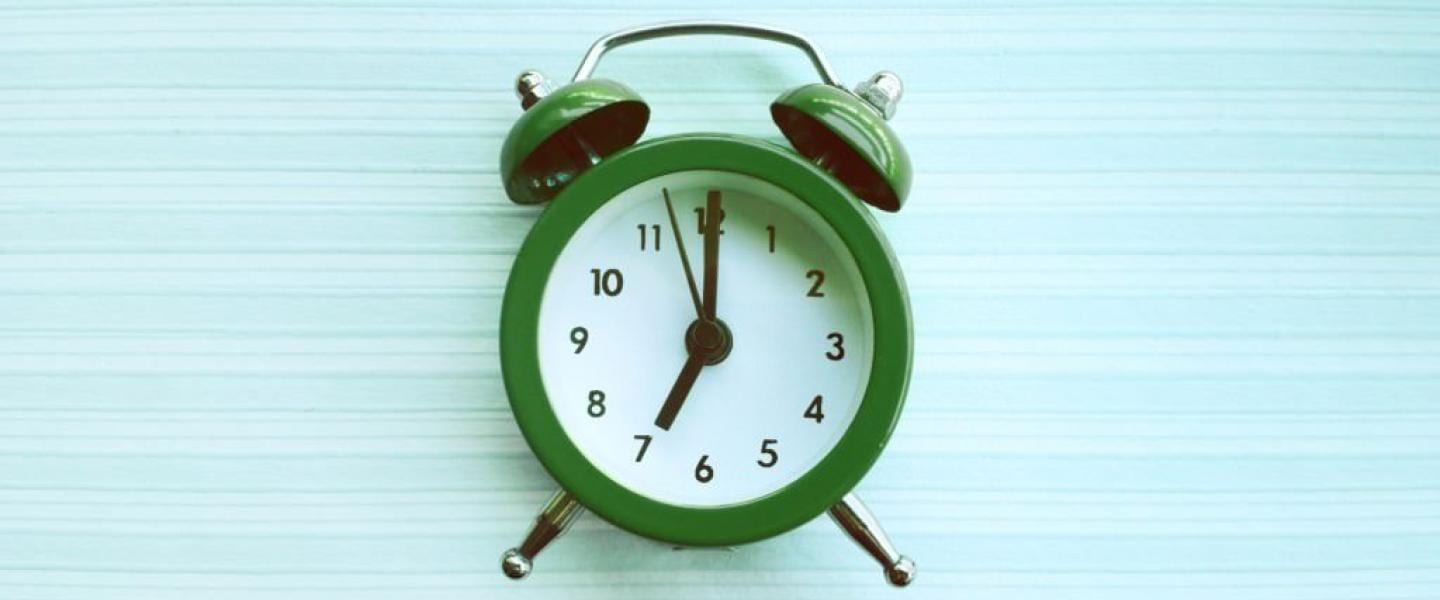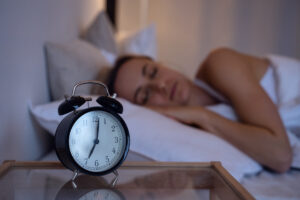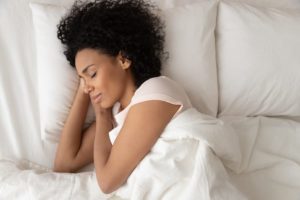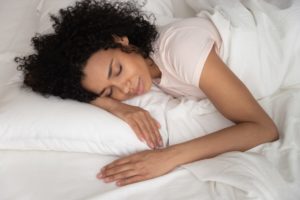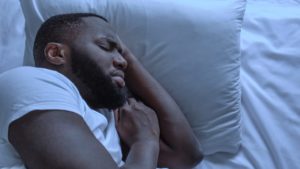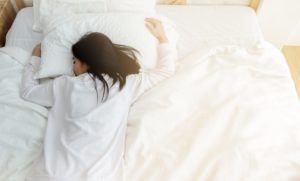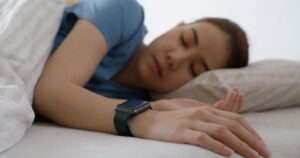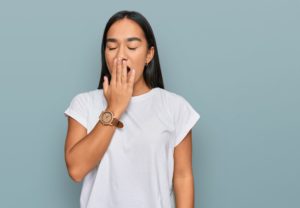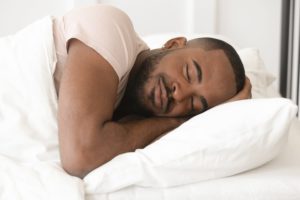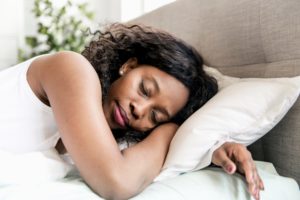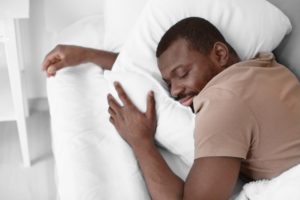When you buy through our links, we may earn a commission. Products or services may be offered by an affiliated entity. Learn more.
Oversleeping
- Sleeping for over nine hours each night may be a sign of a sleep disorder, mental health disorder, or other health issue.
- Sleeping too much can negatively impact your immune system, mental health, heart health, and potentially lead to chronic diseases.
- Record your sleep patterns and improve your sleep hygiene to help stop oversleeping.
- Talk with your doctor about oversleeping if you are concerned about your sleep habits.
Oversleeping, or sleeping for over nine hours in a night, happens for many reasons. Maybe you oversleep because you’re fighting off an illness, or you’re catching up after a few nights of sleep deprivation. However, consistently oversleeping may be the sign of a sleep disorder, mental health disorder, or other health issue. We cover how oversleeping is defined, the various issues that cause oversleeping, and what you can do if you tend to oversleep.
What Is Oversleeping?
Oversleeping, or long sleeping, is defined as sleeping more than nine hours in a 24-hour period. Hypersomnia describes a condition in which you both oversleep and experience excessive sleepiness during the day. Narcolepsy and other sleep disorders commonly cause hypersomnia. Doctors might also call consistent oversleeping that causes you distress in daily life an excessive quantity of sleep (EQS) . When the cause for your sleepiness cannot be found, the disorder is called idiopathic hypersomnia.
On average, most adults require at least seven hours of sleep nightly. A good night’s sleep promotes overall health and mental alertness . Without enough sleep, you may feel sluggish and unable to focus. On the other hand, too much sleep can also affect your health.
The exact amount of sleep you need each night depends on your daytime habits and activities, health, and sleep patterns. Older adults may need only six hours of sleep while other people, such as athletes, may need an extra hour of sleep. Occasionally you may require more sleep than normal, such as after strenuous activity or travel. If another hour of shuteye helps you feel your best, then that amount of sleep is right for your body. If consistently sleeping longer still leaves you tired or even nodding off during the day, it may be a sign of an underlying health issue.
Oversleeping Symptoms
In addition to sleeping more than nine hours a night, other symptoms of oversleeping include:
- Excessive napping during the day
- Excessive daytime sleepiness
- Headache
Is Your Troubled Sleep a Health Risk?
A variety of issues can cause problems sleeping. Answer three questions to understand if it’s a concern you should worry about.
What Causes Oversleeping?
Oversleeping can occur when you try to make up for your “sleep debt.” For example, you may have to stay up late several nights in a row to complete a big project and therefore become sleep deprived. Then, on the weekend you might make up the sleep debt by sleeping longer than normal.
A number of health conditions can also lead to oversleeping and excessive daytime sleepiness:
- Sleep disorders, including sleep apnea, insomnia, and narcolepsy
- Depression and anxiety
- Obesity
- Cardiovascular disease
- Diabetes
- Chronic pain
- Hypothyroidism
Sleep Apnea
Sleep apnea causes you to stop breathing temporarily during your sleep. As a result, you snore and choke during the night and feel sleepy during the day. To make up for poor sleep, you may nap during the day and try to sleep longer at night, leading to oversleeping.
Sleep apnea symptoms are often resolved with appropriate treatment. After a sleep study confirming you have sleep apnea, your healthcare provider may write a prescription for a CPAP machine. This machine helps support your breathing during sleep.
Narcolepsy
There are three types of narcolepsy, but in almost all cases you experience excessive daytime sleepiness and overpowering urges to sleep, called sleep attacks . In secondary narcolepsy, caused by injury to the hypothalamus, you may sleep for more than 10 hours each night. While narcolepsy is a lifelong disorder, it can be managed with treatment, including medication and lifestyle changes.
Idiopathic Hypersomnia
If healthcare professionals can’t identify an underlying cause for your oversleeping, they may diagnose you with idiopathic hypersomnia. This sleep disorder is characterized by difficulty waking , excessive sleepiness, and the inability to feel rested after sleeping at night or napping during the day. With this disorder, you may sleep as much as 14 to 18 hours a day.
For treatment, doctors often prescribe medications similar to what is prescribed for narcolepsy. These medications may not treat idiopathic hypersomnia as effectively as they treat narcolepsy, however. Additionally, if you have idiopathic hypersomnia, you may need to make lifestyle changes such as limiting alcohol and avoiding late-night activities.
Depression and Anxiety
People with depression and anxiety often struggle with sleep disorders or other health disorders. Both oversleeping and difficulty sleeping are effects of depression, and adolescents and older adults with depression are most likely to experience excessive sleepiness . Several studies have shown a higher rate of depression in long sleepers. Other studies show that people with anxiety disorders are also more likely to experience long sleep, which causes them distress.
Many treatments exist for both depression and anxiety. In addition to cognitive behavioral therapy, a number of prescription medications can improve your symptoms. Consult your healthcare provider to determine which methods of treatment are appropriate for you.

Impacts of Oversleeping
Oversleeping impacts your overall health and can have negative effects, just as a lack of sleep does. Early research suggests that longer sleep:
- Worsens inflammation in the body
- Decreases your immune function
- Can lead to chronic diseases
Both short and long sleep durations are associated with a number of health concerns and chronic diseases:
- Obesity
- Frequent mental distress
- Coronary heart disease
- Diabetes
- Stroke
Tips for Avoiding Oversleeping
If you are concerned about oversleeping, talk with your doctor about your sleep and health habits. You may want to keep a sleep diary to record your nighttime sleep and wake times, as well as any naps you take during the day. Your doctor can use this information to help you identify the cause of your oversleeping and suggest a treatment plan.
Regardless of the cause of your oversleeping, you can implement healthy sleep tips to improve your sleep habits:
- Set a Regular Sleep Schedule: Go to bed and wake up at the same time each day. This helps you avoid sleep loss and sleep debt.
- Create a Bedtime Routine: Your routine should help you relax and prepare for sleep. Avoid light from electronics in the hours before bedtime, as this light can delay sleep onset.
- Consider Your Sleep Environment: Your bedroom should be a cool temperature and free of excess light and noise.
- Keep Active: Daily exercise and sunlight exposure help you sleep well at night. Avoid excessive exercise close to bedtime.
- Nap Early: Naps later in the afternoon can make it difficult for you to fall asleep on time at night.

Still have questions? Ask our community!
Join our Sleep Care Community — a trusted hub of product specialists, sleep health professionals, and people just like you. Whether you’re searching for the perfect mattress or need expert sleep advice, we’ve got you covered. Get personalized guidance from the experts who know sleep best.
References
13 Sources
-
Kim, Y., Wilkens, L. R., Schembre, S. M., Henderson, B. E., Kolonel, L. N., & Goodman, M. T. (2013). Insufficient and excessive amounts of sleep increase the risk of premature death from cardiovascular and other diseases: The multiethnic cohort study. Preventive Medicine, 57(4), 377–385.
https://pubmed.ncbi.nlm.nih.gov/23811525/ -
A.D.A.M. Medical Encyclopedia. (2020, January 29). Sleep disorders. MedlinePlus., Retrieved May 9, 2021, from
https://medlineplus.gov/ency/article/000800.htm -
Ohayon, M. M., Reynolds, C. F., & Dauvilliers, Y. (2013). Excessive sleep duration and quality of life. Annals of Neurology, 73(6), 785–794.
https://pubmed.ncbi.nlm.nih.gov/23846792/ -
Consensus Conference Panel, Watson, N. F., Badr, M. S., Belenky, G., Bliwise, D. L., Buxton, O. M., Buysse, D., Dinges, D. F., Gangwisch, J., Grandner, M. A., Kushida, C., Malhotra, R. K., Martin, J. L., Patel, S. R., Quan, S. F., Tasali, E., Non-Participating Observers, Twery, M., Croft, J. B., Maher, E., … Heald, J. L. (2015). Recommended amount of sleep for a healthy adult: A joint consensus statement of the American Academy of Sleep Medicine and Sleep Research Society. Journal of Clinical Sleep Medicine, 11(6), 591–592.
https://pubmed.ncbi.nlm.nih.gov/25979105/ -
MedlinePlus: National Library of Medicine (US). (2014, April 14). Healthy Sleep., Retrieved May 9, 2021, from
https://medlineplus.gov/healthysleep.html -
Kikuchi, H., Yoshiuchi, K., Yamamoto, Y., Komaki, G., & Akabayashi, A. (2011). Does sleep aggravate tension-type headache?: An investigation using computerized ecological momentary assessment and actigraphy. BioPsychoSocial Medicine, 5(1), 10.
https://pubmed.ncbi.nlm.nih.gov/21835045/ -
Léger, D., Beck, F., Richard, J. B., Sauvet, F., & Faraut, B. (2014). The risks of sleeping “Too much”. Survey of a national representative sample of 24671 adults (INPES health barometer). PLoS ONE, 9(9), e106950.
https://pubmed.ncbi.nlm.nih.gov/25226585/ -
Liu, Y., Wheaton, A. G., Chapman, D. P., & Croft, J. B. (2013). Sleep duration and chronic diseases among US adults age 45 years and older: Evidence from the 2010 behavioral risk factor surveillance system. Sleep, 36(10), 1421–1427.
https://pubmed.ncbi.nlm.nih.gov/24082301/ -
A.D.A.M. Medical Encyclopedia [Internet]. Atlanta (GA): A.D.A.M., Inc.; c1997-2019. Drowsiness., Retrieved May 9, 2021, from
https://medlineplus.gov/ency/article/003208.htm -
Strohl, K. P. (2019, March). Merck Manual Consumer Version: Sleep Apnea., Retrieved May 9, 2021, from
https://www.merckmanuals.com/home/lung-and-airway-disorders/sleep-apnea/sleep-apnea -
A.D.A.M. Medical Encyclopedia. (2021, May 4). Narcolepsy. MedlinePlus., Retrieved May 9, 2021, from
https://medlineplus.gov/ency/article/000802.htm -
A.D.A.M. Medical Encyclopedia. (2019, April 8). Idiopathic hypersomnia. MedlinePlus., Retrieved May 9, 2021, from
https://medlineplus.gov/ency/article/000803.htm -
National Institute of Mental Health. (2020). Depression., Retrieved May 9, 2021, from
https://www.nimh.nih.gov/health/publications/depression/




